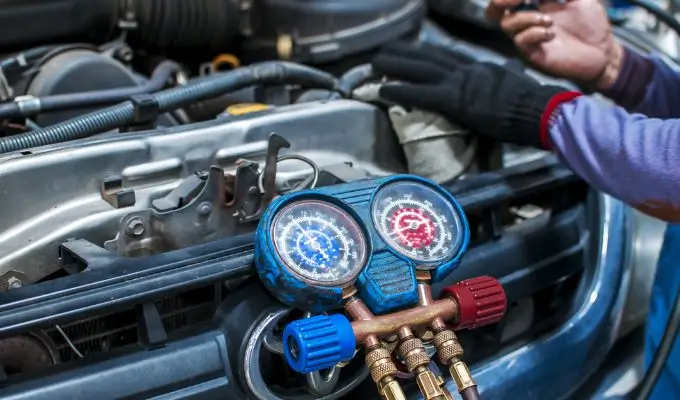
What happens when your car AC starts blowing hot air, right in the middle of Sheikh Zayed Road traffic? You roll down the windows, but it is 44°C outside and the sweat is instant. You hope it is just low gas. But what if it is not? A car AC gas leak rarely fixes itself. The longer you wait, the more pressure builds, and not just in the system. Repairs go from minor recharge to compressor replacement. That is why quick Car AC gas leak repair in Dubai is not just smart, it saves you money.
What Is AC Gas in a Car?
When the air conditioning in your car ceases to cool, it is not normally the fan. The only thing that makes the air cool before it reaches your face is the AC gas, otherwise known as the refrigerant, which is a chemical compound that flows through the AC system on your car. It is transported out of the compressor to the condenser and all the way to the evaporator. In that cycle, it captures the heat into the cabin and releases it into the outside. And that is the way you get cool air indoors even in the worst heat of Dubai. Refrigerants are of various types though R134a and R1234yf are the most common used in cars in Dubai. R12 is still used in some of the older models, but this is now rare because of environmental regulations.
This chemical escapes when there is an AC gas leakage. Lack of sufficient refrigerants means that your vehicle AC will no longer be able to cool air. And the system must be made to toil, which causes increased wear on such parts as the compressor clutch and pressure switch. Whenever your mechanic recharges your car AC gas, he is replenishing this gas. However, the problem is as follows: when there is a leak, it is not a solution in the long run to fill it up. You must first find out the car AC gas leak and fix it, and then recharge. Your whole cooling system is nothing but an advanced piped fan without AC gas. It is something intangible, yet it is needed at all costs.
What Causes a Car AC Gas Leak?
A leak of car AC gas does not occur randomly. It accumulates gradually, sometimes without making a lot of noise and one day you turn on your car and in place of the dial which is used to turn the gas you just hear warm air. And what then actually causes the leak? Let’s break it down.
Heat-Damaged O-Rings & Seals
The rubber seals used in the AC system in the climate of Dubai deteriorate quicker than normal. These seals are expected to retain the gas. However, placed under the intense heat day in, day out they contract, become dry and crack. All that it takes is that small crack which allows AC gas to begin leaking.
Corroded Evaporator Core
You will not lay your eyes on this portion unless your dashboard is taken off. The cold side of things is done by the evaporator coil which also gathers moisture and dirt. This results overtime in corrosion and microscopic holes. It is the most difficult to notice these small leaks and observe the slowest loss of car AC gas.
Cracks in Flexible AC Hoses
The refrigerant carrying hoses are pressurized. And then there are vibrations that are produced by the engine and an everyday use, and it is of no surprise that they will grow weaker. Leaks of gas are not seen because of small cracks, particularly in areas of connection. You may continue filling it without even knowing that the problem is in the hose.
Defective Service Valves (Schrader Valves)
Had gas filled up and emptied once more in a week? The issue may not necessarily be within the system. It might be leaking directly at the valve of adding the gas. When this small component malfunctions, it will burst out releasing gas gradually. A majority of leakages by these valves are not noticed until they are adequately tested.
Stone Hit on the AC Condenser
One small rock from the road. That is all it takes. The front of the car has a condenser that can be bumped. Even a small dent may burst the aluminum tubing or weaken a joint. This is a popular cause of car AC gas leak in Dubai where sand, gravel, and debris are a common phenomenon.
Compressor Fittings Loosening
The compressor forces the gas (no, actually) and drives it into the system. The bolts and fittings of it are, however, subject to constant pressure and vibration. Over time, they loosen. Or worse, the internal seals are worn off. When that occurs, gas begins escaping out of the core of the system itself.
Each of these reasons, however minor, may eventually result in greater harm in case they are not resolved. The more you keep leaking the more your system works. It translates to increased pressure, increased wear and ultimately failed parts that cost a lot. Early repair of the car AC gas leak is not all about cold air. It involves saving your system, and your wallet.
The Early Warning Signs of AC Gas Leakage You Can Not Afford to Miss.
When there is a leak of AC gas in your car, there is no warning letter on your dashboard. It creeps in slowly. There is a possibility that the damage will have propagated by the time the system is blowing the warm air only. These are some of the first signs to see and work before prices soar.
Poor Cooling With Full Power Up
When the air is just slightly cooler than outside, it is a common indication that refrigerant is diminishing. Having reduced gas, the evaporator is not able to absorb sufficient heat. It is among the initial symptoms that can be noticed by car AC gas problem.
Hissing or Bubbling Noise
The pressure causes escaping gas which makes a faint hissing sound. There may be bubbling in case the leak is within the evaporator. Mechanics usually verify this by applying electronic detectors in the detection of leaks in car AC.
Oily Residue Around AC Pipes
Refrigeration oil moves along with the gas. It is a physical indication that refrigerant is escaping normally when you find wet or oily areas on hoses, valves or on the condenser. This is the reason why professionals will check in case of stains during repair of AC leakages.
Frequent Need for Gas Top-Up
When your AC appears okay after refilling but it is weak once more in the course of weeks, then it is not consuming any gas, it is losing it. One of the requirements of a healthy system is that refrigerant can be kept over years without the necessity to replenish AC gas on a regular basis.
Sudden Foggy Windows Inside
When moisture is mixed with low content of refrigerant it may condense on the glass. Any weird fogging in Dubai during humid evenings is observed by drivers as a useful indication of the presence of leaks that are not visible.
Compressor Cutting In and Cutting Out
Low refrigerant quantities lead to the cycling on and off of the compressor by pressure sensors. This clicking at high rate or unbalanced activity indicates that the system is straining, and this is usually because of a leak in the car AC gas.
Early detection of these signs will ensure that you fix the leak before the compressor or the condenser dies altogether. An early diagnosis of the car AC gas leak and timely repair in Dubai will always be cheaper than the end result when the system went out.
The Real Findings of a Car AC Gas Leak
A car AC gas leak can be frustrating, especially when you cannot see it, smell it, or hear it clearly. Unlike an oil leak that leaves a stain under your car, refrigerant vanishes into thin air. So how do professionals figure out where the leak is? It’s not guesswork. It is a process, and every step matters. Here’s how Expert Car AC Repair Garage Dubai detect the leak before things get worse:
Visual Inspection First
All AC diagnostic starts with fundamentals. The mechanic seems to inspect joints, valves, hoses, and the compressor to see whether they are greasy or stained. Fridge oil is easily traced as a result of a minor leakage. This will save time alone in case the leak is visible.
UV Dye Injection
The AC system is provided with a special fluorescent dye in the form of a refrigerant. Once the car is running a bit, a light in the UV is then scanned over the entire system. The leak is also bright as it is being lit, be it at the condenser, evaporator or the water hose. This is among the most precise techniques applied to the detection of car AC gas leaks in the Dubai workshops.
Nitrogen Pressure Test
Technicians apply dry nitrogen gas when the system has emptied or lost its dye too quickly that it circulated. The system is pressurised and when the pressure drops in those points it is immediately flowing to a leak. Such an approach is particularly useful in the case of slow and internal leakages.
Sniffer: Electronic Leak Detector (Sniffer)
This is a hand-held device that sniffs out refrigerant in the air. It is able to identify the smallest bit of R134a or R1234yf gas that gets out of fittings, valves, or micro-cracks. It is applicable in cases where the leaks are concealed or intermittent.
Bubble Test with Soapy Water
The oldest approach is sometimes still effective. Thought-to-be points of leakage are sprayed in a soapy mix. When bubbles develop, then the gas is escaping. This is frequently applied as a second check upon the usage of other tools. Particularly applied to leaks in valves and joints in pipes.
System Isolation
When the technician is trying to troubleshoot the system in a tough situation, they might switch off sections of the system such as the evaporation or condenser and do some tests on them separately. This is more time consuming but it aids in identifying internal leaks which cannot be seen externally.
Concisely, it is not by guessing one can find a car AC gas leak. It is concerned with the appropriate tools in the appropriate sequence. A good technician understands what to search, and when to cease refilling and begin repairing.
How It Works | Auto Parts: Repairing a Car AC Gas Leak
You present yourself to the workshop with your AC barely cooling and they inform you that it is a leakage of car AC gas. But what really happens next? Is it only a refill, or is there something more than that? The following is an operation by operation account of what a real AC gas leak repair consists of, in order that you can know what you are paying, and why each bit of it is important:
Full AC System Inspection
This is done prior to any form of touching: the technician examines the large components: compressor, condenser, pipes, and valves. They seek oil patches, cracks or loose fittings. When it is evidently damaged, such as a punctured pipe or a broken seal, it is flagged and replaced the first.
Leak Detection Process
Next, they run the leak test. This may include adding UV colour, a sniffer or nitrogen pressure test. The goal? Locate the actual leak point of the car AC gas, not hit or miss refills.
Replacing Faulty Parts
Damaged parts are changed once the leak is discovered. This may be a hose, a valve or in some uncommon situations, the evaporator. People prefer original components and not OEM-labeled components which might not be able to withstand the heat of Dubai.
Vacuuming the AC System
Once the leak has been covered, the system is vacuumed. This stage eliminates air, moisture and other residual contaminants within the lines. Failure to do this may cause the ice formation within your system, which is bad in cooling and spoils the compressor.
Recharge of the AC Gas (Recharge)
Now comes the AC gas refill. This is not done blindly. They follow the digital gauges to introduce an appropriate volume of the R134a or the R1234yf, depending on the specification of your car. With overcharging or undercharging, efficiency will be lowered and may end up spoiling parts.
System Pressure / Cooling Test
Finally, the AC is turned on. The pressure levels are checked on high and low sides. Cabin temperature is monitored. In case all things stand still, the leakage in the car AC gas is repaired. You have cool air and more than that you do not have any silent gassing.
The thing is that the correct car AC gas leak repair cannot be reduced to the addition of gas and hoping that it will work. It is truly a process, one that starts with the leak discovery and proceeds through the process of leak sealing and recharging with each process designed to ensure your system lasts longer.
How Much a Car AC Gas Leak Repair Would Actually Cost in Dubai?
The thought of AC gas leak comes across your mind and you instantly think of a fat bill. But is it always expensive? Not really. The price will be determined by the point of leak, components and the time you will discover it. Most drivers in Dubai are spending unwisely since they take long before they repair or they refuel gas continually without correcting the underlying problem. We can subtract the actual costs of AC gas leak repair, not an assumption, but what you can really hope to pay at a professional garage.
| Service Type | What It Includes | Estimated Price (AED) |
|---|---|---|
| AC Gas Leak Detection | UV dye test/electronic sniffer diagnosis | 150 – 300 |
| Nitrogen Pressure Leak Test | Micro-leaks check Dry nitrogen: pressurized | 200 – 400 |
| Basic AC Gas Recharge (R134a) | Vacuum + proper refill of refrigerant + pressure balancing | 150 – 250 |
| AC Gas Recharge (R1234yf) | Newer models use premium gas, which changes according to the quantity of gas | 300 – 600 |
| Schrader Valve Replacement | Malfunctioning refill valve replacement + seal | 100 – 150 |
| Hose or Seal Replacement | Includes part + labor + recharge where necessary | 300 – 700 |
| Repair of Leaks in Compressor or Condenser | Full system recharging + replacement of parts + testing | 800 – 2,000+ |
They may differ a little in terms of the car model and the quality of the shop, but they are reasonable averages according to the workshop standards of Dubai. Never be satisfied with filling up with the gas only but always ask whether recharge includes vacuuming and sealing of the leaks. Having a car AC gas leak and not taking action on this because it seems like you are saving money in the short term is the same thing that will cost you twice or even more when the compressor motor burns out or the whole system halts completely.
Stop Before It Leaks | How to Prevent AC Gas Problems in Your Car?
Repairing a motor vehicle gas leak is one thing. But to prevent the next one that is not even yet? There you will really save time, money and stress. The majority of AC leaks could be prevented, provided you are aware of what to pay attention to. The following are easy and ingenious methods of preserving the AC system of your car closed and functioning:
AC Weekly (Even in Winter) Run
Yes, even when it is cold. This maintains the lubrication of the seals and gaskets within your system. When they dry they become leaky. One or two minutes a week is sufficient.
Turn on the AC on Recirculation Mode
This will reduce the load on the AC since it cools already chilled air. Fewer hours to work, fewer stresses and fewer possibilities of leakage of car AC gas.
Don’t Delay AC Service
Should the cooling lessen in the least; do not wait months to investigate. The early detection of a leak implies a fast repair. Wait much longer and you are paying to parts as well.
Request UV Dye + Every Gas Recharge
To identify leaks in the future, it is added with UV tracer dye. It is cheap and assists in saving big at the next check of your system.
Avoid Cheap Gas Recharges
The system may be damaged by uncelebrated machines, incorrect types of gas, and overfilling. Ensure that your car ac gas fill up is done with the right equipment, by a person who is familiar with your car.
Keep the Condenser Clean
The accumulation of sand and dust leads to the overheating of the system and stress. Request rapid rinser condenser in service. It can be done within minutes and allows avoiding the gas leakage under pressure.
You do not have to use any special equipment to maintain your AC dry. This is just normal usage, intelligent usage, and correct upkeep. The smallest of steps will today prevent the next car AC gas leak to ruin your weekend drive.
Conclusion
When your air conditioner is ineffective, loud, or simply failing to cope with the Dubai heat, then you do not wait to notice the difference. Having a car leak AC gas is one of such things that may begin small and before long, it may serve as a big blow to your wallet. The majority believe that it will be solved by a quick gas top-up, yet, unless the leak is located and repaired, this refill will only be buying time. And not much of it.
We never just guess, we detect, seal and recharge at Car AC Heroes. It could be an evaporator overflow that is not obvious but a faulty valve or simply old seals, we will correct it before it turns into a complete system breakdown. Book today and have your AC leak fixed and be back on the road without emptying your wallet. Book or call and have our good guys come to your place and fix your AC gas leak in Dubai, quickly, reasonably and correctly.
Share this article
Written by : UAE Script Staff
Follow us
A quick overview of the topics covered in this article.
Latest articles
February 4, 2026
February 4, 2026
February 4, 2026


